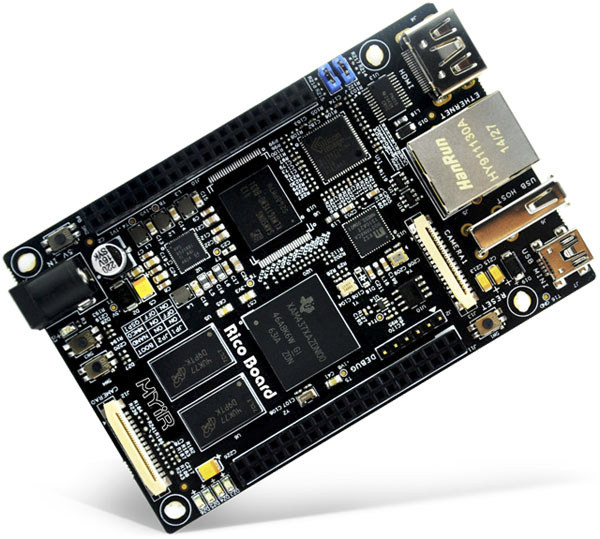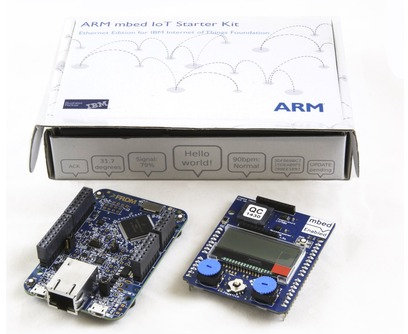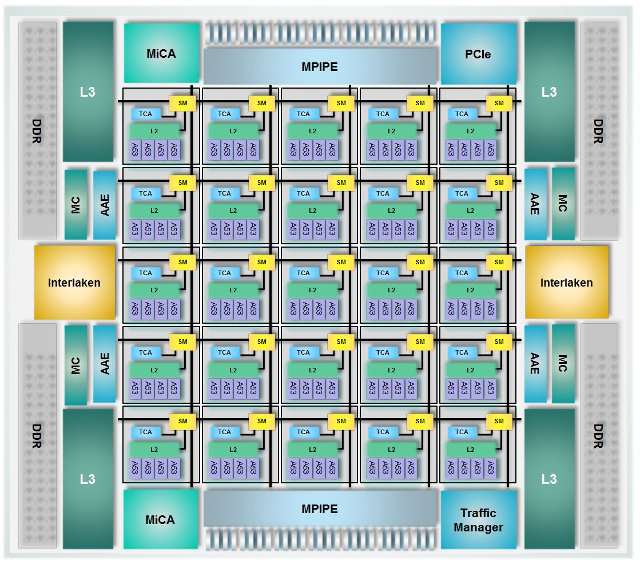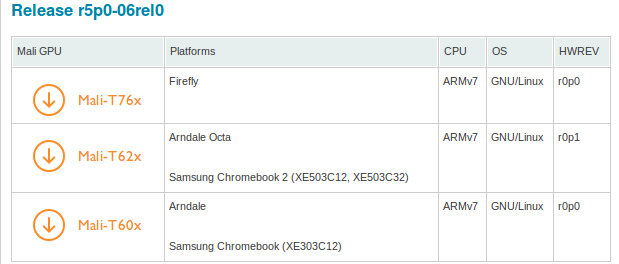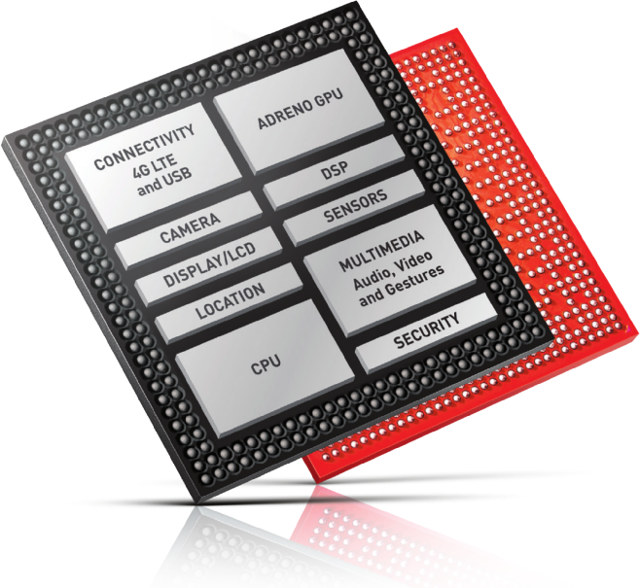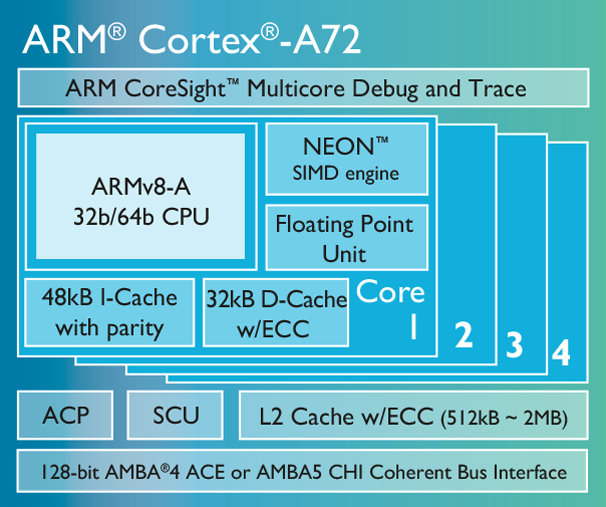Shenzhen based MYIR Tech has just launched two new single board computers with Rico board featuring Texas Instruments Sitara AM437x ARM Cortex A9 industrial processor, and Z-Turn board based on Xilinx Zynq-7010 ARM Cortex A9 + FPGA SoC. Both boards sell for $99 in single quantity. Rico Board Specifications: SoC – Texas Instruments AM4379 single core ARM Cortex A9 processor @ 1.0GHz with PowerVR SGX530 GPU, and 4x PRU @ 200 MHz. Other AM437x on request. System Memory – 512MB DDR3 (Options: 256MB or 1GB) Storage – 4GB eMMC, 256 or 512 MB NAND flash (reserved), 16MB QSPI flash, 32KB EEPROM, and micro SD slot Video Output – HDMI and LCD interfaces (LCD connector located on bottom of the board). Connectivity – 10/100/1000 Mbps Ethernet USB – 1x mini USB 2.0 device port, 1x USB 2.0 host post Camera – 2x 30-pin camera interface Debugging – 1x debug serial port, […]
Freescale Kinetis based Mbed IoT Starter Kit Ethernet Edition Connects to IBM IoT Cloud
ARM, IBM and Freescale have jointly announced Mbed IoT Start Kit – Ethernet Edition at Embedded World 2015 that consists of a Freescale Kinetis Cortex M4 mbed-enabled development board and a sensor IO application shield that interface with IBM Bluemix cloud platform. Freescale FRDM-K64F Freedom development board specifications: MCU – Freescale Kinetis K64 (MK64FN1M0VLL12) ARM Cortex M4 MCU @ 120 MHz with 1 MB flash memory, 256 KB RAM External Storage – SDHC slot Connectivity – 10/100M Ethernet USB – Dual role USB interface with micro-B USB connector Sensors – FXOS8700CQ accelerometer and magnetometer Headers – Arduino R3 compatible I/O connectors Misc – RGB LED, two user push buttons Power Supply – OpenSDAv2 USB, Kinetis K64 USB, and external source The board also features a programmable OpenSDAv2 debug circuit supporting the CMSIS-DAP Interface software that provides a mass storage device (MSD) flash programming interface, or a CMSIS-DAP debug interface, or […]
EZChip TILE-Mx100 is a Network Processor with 100 ARM Cortex A53 Cores
As ARM gets into the server and networking business, the number of ARM cores in SoC starts to shoot up, and after Cavium ThunderX 48 core processor, here comes EZChip TILE-Mx100 Hecta-core network processor with 100 ARM Cortex A53 cores and capable of delivering up to 200 Gigabit throughput. Key features listed for EZchip TILE-Mx100: One hundred 64-bit ARM Cortex A53 CPU cores in one chip 3-level coherent cache architecture with over 40 Mbytes on-chip cache. DDR4 DRAM controllers with ECC and supporting up to 1TBytes of memory. SkyMesh coherent architecture for massive bandwidth, low latency and linear scalability Multitude of networking hardware accelerators for high-performance data-path packet processing including Wire-speed mPIPE packet processing engine delivering 300 million packets-per-second I/O. Integrated 5-level hierarchical Traffic Manager with 256,000 queues. MiCA™ acceleration engines for over 100Gbps of crypto. Over 200Gbps of integrated I/O including 1G, 10G, 25G, 40G, 50G, 100G Ethernet, Interlaken, PCIe […]
ARM Releases Kernel Drivers for Mali-T880 / T860 GPUs, User Space Drivers for Mali-T76x GPUs
ARM Mali GPU drivers includes both open source kernel drivers, and binary userspace drivers supporting framebuffer and/ior X11 implementation. The former is rarely an issue and is quickly released, but the latter requires porting and testing for a specific hardware platform, as well legal work, which greatly delay the releases. Mali-T880 GPU was announced at the beginning of the month together with ARM Cortex A72, and on February 17, 2015, ARM released an update to their Mali-T600 series, Mali-T700 series & Mali-T860/T880 GPU kernel device drivers with revision r5p1-00rel0 that adds supports to Mali-T860 and Mali-T880 GPU. These open source drivers are available for Android and Linux, and also support early Mali-T700 and T600 GPUs. Separately, the company has also released Mali-T76X GPU drivers for Firefly board powered by Rockchip RK3288 quad core Cortex A17 processor featuring a Mali-T764 GPU. The first release only supports the framebuffer driver, but ARM […]
Qualcomm Unveils Snapdragon 650 and 652 ARM Cortex A72 / A53 Processors
[Update: Title updated to reflect the new names of the processors. Snapdragon 618 is now Snapdragon 650, and 620 is now 652 to reflect the better Cortex A72 cores used in those processors] Qualcomm has announced four new processors including Snapdragon 415 and 425 octa-core Cortex A53 processor, as well a Snapdragon 618 and 620 big.LITTLE processor with the latest Cortex A72 cores coupled with four Cortex A53 little cores. Snapdragon 618 is the hexa-core version with 2 Cortex A72 cores, while Snapdragon 620 comes with eight cores including 4 Cortex A72, but apart from the difference in number of cores, both share the same technical specifications: CPU Snapdragon 618 – 64-bit dual-core ARM Cortex A72 @ 1.8GHz and quad-core Cortex A53 @ 1.2GHz Snapdragon 620 – 64-bit quad-core ARM Cortex A72 @ 1.8GHz and quad-core Cortex A53 @ 1.2GHz GPU – Next generation Qualcomm Adreno GPU with support for […]
Linux 3.19 Release – Main Changes, ARM and MIPS Architectures
Linus Torvalds released Linux Kernel 3.19 yesterday: So nothing all that exciting happened, and while I was tempted a couple of times to do an rc8, there really wasn’t any reason for it. Just as an example, Sasha Levin used KASan and found an interesting bug in paravirtualized spinlocks, but realistically it’s been around forever, and it’s not even clear that it can really ever trigger in practice. We’ll get it fixed, and mark it for stable, and tempting as it was, it wasn’t really a reason to delay 3.19. And the actual fixes that went in (see appended shortlog) were all fairly small, with the exception of some medium-sized infiniband changes that were all reverting code that just wasn’t ready. So it’s out there – go and get it. And as a result, the merge window for 3.20 is obviously also now open. Linus Linux 3.18 improved performance of […]
Embedded Linux Conference 2015 Schedule – IoT, Cars, and Drones
Embedded Linux Conference 2015 will take place in San Jose, California, on March 23 – 25, 2015, and will focus on Drones, Things and Automobiles. The schedule has been published, and whether you’ll attend or not, it’s always interested to have a look at what will be talked about to have a peak into the future of Embedded Linux, or simply keep abreast with the progress in the field. So as usual, I’ve gone through the schedule, and made my own virtual program with talks that I find interesting. Monday 23rd 9:00 – 9:30 – Driving standards and Open Source to Grow the Internet of Things by Mark Skarpness, Director of Systems Engineering at Intel Billions of devices are beginning to come online, and many of these devices, large and small, are running open source software. To fuel this innovation, it’s more important than ever for these devices to use […]
ARM Unveils Cortex A72 Processor and Mali-T880 GPU
ARM has just announced their new Cortex A72 ARMv8 core with 3.5 times the performance of Cortex A15 ARMv7 cores, together with Mali-T880 GPU delivering 1.8 times the performance of Mali-T760, and CoreLink CCI-500 Cache Coherent Interconnect to link the new CPU, GPU and I/Os together. ARM Cortex A72 Some of the key features of the new core include: Architecture – ARMv8-A Multicore – 1-4x SMP within a single processor cluster, and multiple coherent SMP processor clusters through AMBA 5 CHI or AMBA 4 ACE technology ISA Support AArch32 for full backward compatibility with ARMv7 AArch64 for 64-bit support and new architectural features TrustZone security technology NEON Advanced SIMD DSP & SIMD extensions VFPv4 Floating point Hardware virtualization support Cache – 48KB I-cache, 32KB D-cache, and 512 KB to 2MB L2 cache with ECC Debug & Trace – CoreSight DK-A57 Process – 16nm FinFET A cluster can support up to […]


